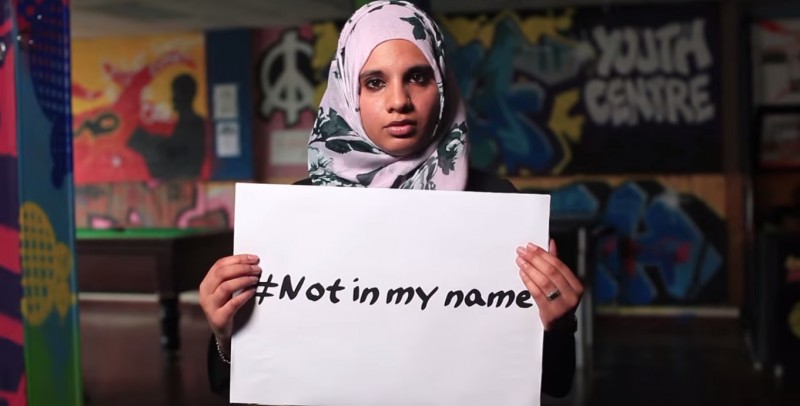Should Muslims Apologize for ISIS’ Atrocities?
Speaking at the United Nations General Assembly on September 24, US President Barack Obama said that “it is time for the world – especially Muslim communities – to explicitly, forcefully, and consistently reject the ideology of al Qaeda and ISIL”.
Obama mentioned Muslim leaders and initiatives, such as the the #NotInMyName campaign, denouncing the ideology and gruesome atrocities of ISIS, a splinter group of Al Qaeda that has come to control large parts of Iraq and Syria using openly brutal, oppressive and violent tactics.
The Active Change Foundation (ACF) launched the campaign in Britain, in the wake of the beheading of British aid worker David Haines, to prove that “ISIS do not represent British Muslims” and that it “has nothing to do with them.”
ACF said about the campaign on the foundation's website:
Islam teaches peace, respect and love. ISIS is hiding behind a false Islam. It’s nothing to do with what we stand for. Tell ISIS that they can’t murder in your name.
The campaign went viral on Twitter with thousands of tweets published under the hashtag #NotInMyName. Here is a sample of those tweets:
These people (ISIS) have nothing to do with Islam, absolutely nothing to do with our religion. #NotInMyName
— Hamza Yusuf (@hamzayusuf) September 23, 2014
ISIS evil must be removed & Muslims all over the world shall come forward and say #NotInMyName they do not represents any Islamic ideology
— GuRRu (@lGuRRul) September 26, 2014
However, not all Muslims are comfortable with the fact they are somehow expected or pressured to apologize for crimes they have no hands in or on behalf of groups that commit atrocities in the name of their religion.
I do & don't like the #NotInMyName campaign. It's right to speak out but it sends out the message we are to be held accountable every time.
— Wiam (@UncolonisedMind) September 21, 2014
I'm tired of seeing Muslims rip themselves apart in apologies to prove their humanity to Islamophobes with campaigns like #notinmyname
— Selin Kara (@Selintifada) September 23, 2014
After all, they were not the ones who gave ISIS a mandate to kidnap and behead journalists and aid workers, displace and persecute religious and ethnic minorities, execute all those who come in their way and brainwash innocent children into violence and hatred.
Besides, Muslims are themselves victims of this radical group. Only on September 22, lawyer and human rights defender Samira Saleh Al-Naimi was executed by masked men belonging to ISIS when they opened fire at her in a public square in the city of Mosul, Iraq. According to the Gulf Center for Human Rights, ISIS kidnapped Al-Naimi last week from her home after she described the group as ‘barbaric’.
On the Guardian's Comment is Free section, Mehreen Faruqi, a Greens member of parliament in New South Wales Parliament in Australia, wrote that though she knows that ISIS’ actions #AreNotInMyName, she ‘won't be pressured to apologise for them’.
For Faruqi the #NotInMyName campaign implies that ‘Muslims are somehow responsible for the atrocities taking place in Iraq and must speak out against them to prove otherwise’. She adds:
No one can deny that video footage of journalists being beheaded by Isis operatives and ongoing news of vicious massacres are extremely distressing, eliciting a raw emotional response, requiring us to take action. But why should a whole community be compelled to apologise for or distance themselves from despicable actions they have no part in?
On Twitter, the satirical hashtag #MuslimApologies was launched to parody the situation whereby Muslims often find themselves obliged to apologize for and distance themselves from the actions of extremist Islamic groups or individuals.
I'm going to just wear this shirt every day from now on. #MuslimApologies pic.twitter.com/EuKG20tNXP
— Maha Hilal (@mahmooha2013) septiembre 23, 2014
Im sorry young boys are radicalized wen the US nd its allies drone and kill their entire families as collateral damage. #MuslimApologies
— Hamza Al-ayyubi (@Hamza_alAyubbi) September 23, 2014
I'm sorry my beard scares you. It's hormonal, I swear #MuslimApologies
— Raz (@raztweets) September 23, 2014
As a Muslim I apologies for the World War One & World War Two even it has nothing to do with the Muslims but just in case. #MuslimApologies
— الكيلاني مليونة (@elkilanimaliuna) September 23, 2014
I'm sorry for being a white Muslim who doesn't look Arab. It's confusing, and I'm very ashamed. #MuslimApologies pic.twitter.com/dmz6cMBeug
— Liesel Hess (@LieselHess) September 25, 2014
As a doctor, I apologize for saving thousands of non-Muslim lives. Better deal with it as I will do it again and again. #MuslimApologies
— Muslimerican (@FaheemYounus) September 26, 2014
I'm sorry you need me to explicitly tell you I disagree with murder, genocide and rape. #MuslimApologies
— Dalia Mogahed (@DMogahed) September 26, 2014
For many, the contributions of Muslims to humanity seem to have little value in the face of growing Islamophobia. Kam Shaheen reminds us of some of those inventions that have changed the world to make it a better place:
Sorry for Algebra, cameras, universities, hospitals, oh and coffee too. #MuslimApologies
— theconsciousmuslim (@kam_shaheen) September 24, 2014
